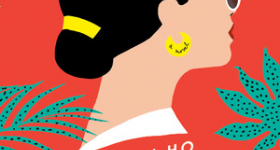For anyone who likes to read the book before seeing the movie, the clock has been ticking on Jenny Han’s young adult novel, To All the Boys I’ve Loved Before (Simon & Schuster BFYR), since it was first published in 2014. The Netflix movie is out and streaming now, but a new paperback edition of the book is here to help those who are late to the game avoid video spoiler-land. With New York Times Bestseller status, two follow-up volumes and the movie, clearly the book has legs. It’s past time to find out why.
Main character Lara Jean sums up the book’s premise herself: “Remember how my hatbox went missing? … It had letters inside, letters I wrote to the boys I loved. They were supposed to be private, they were never supposed to be sent, but then somebody did, and everything turned into a mess.” Lara Jean has had five serious crushes and zero boyfriends. With her sister newly away at college, facing the fallout of the hatbox incident teaches Lara Jean how to cope with change.
The love letters Lara Jean writes are meant to be endings. After pouring out her feelings for a boy, she’s over him — usually. We get to see some of the letters, which are entertaining and encapsulate her voice and values. The first letter, written for her first crush, Peter, is from back in middle school:
Dear Peter K,
First of all I refuse to call you Kavinsky. You think you’re so cool, going
by your last name all of a sudden. Just so you know, Kavinsky sounds like
the name of an old man with a long white beard.
… Here are all your worst qualities:
You burp and you don’t say excuse me. You just assume everyone else
will find it charming. And if they don’t, who cares, right? Wrong! You do
care. You care a lot about what people think of you ...
Lara Jean does not plan to mail this letter, but she wants to be fair to Peter, so she continues:
… Even though you don’t deserve it, fine, I’ll go into all the things I
like(d) about you:
One time in science, nobody wanted to be partners with Jeffrey Suttleman
because he has BO, and you volunteered like it was no big deal. Suddenly
everybody thought Jeffrey wasn’t so bad.
You’re still in chorus, even though all the other boys take band
and orchestra now. You even sing solos. And you dance, and you’re not
embarrassed …
Lara Jean’s letter to Josh, the boy next door, while never revealed, drives the plot. Lara Jean tries to shut down her romantic feelings for Josh because he and her older sister Margot are dating. After Margot breaks up with him and he receives Lara Jean’s letter, he seems ready to reciprocate her feelings, but she wants to keep their friendship platonic for Margot’s sake.
To put him off, she impulsively claims she’s dating Peter. Surprisingly, Peter agrees to go along with the charade. His girlfriend of four years has just dumped him, and a new romance will help him save face. Lara Jean tries to decide where she belongs, as she grows closer to both Josh and Peter, and feels more distant from Margot, who is in Scotland. Lara Jean recounts the toll distance takes on a relationship:
When someone’s been gone a long time, at first you save up all the things you want to tell them. You try to keep track of everything in your head. But it’s like trying to hold on to a fistful of sand: all the little bits slip out of your hands, and then you’re just clutching air and grit. That’s why you can’t save it all up like that.
Because by the time you finally see each other, you’re catching up only on the big things, because it’s too much bother to tell about the little things. But the little things are what make up life … Now everything feels like you had to be there and oh never mind, I guess it’s not that funny.
Letters are a recurring motif of the novel. In the pretend-dating contract Lara Jean and Peter draw up, he volunteers to write her a note every day because he thinks this will make his old girlfriend jealous. Lara Jean understands that “letters written in his handwriting on actual paper … were proof, solid and tangible, that [he] was thinking about her.” The notes are short and mundane, like “Meet me at your locker after school,” but Peter keeps them coming and they start to add up to something. Finding and reading a letter in Margot’s room, Lara Jean discovers a secret Margot has kept since before she moved away: Margot and Josh had sex. The secret feels like a betrayal to Lara Jean. Why didn’t Margot tell her? She feels like she doesn’t know her sister anymore. The steamiest scenes in Lara Jean’s story are about kisses, though rumors at school might suggest otherwise.
Two facts of Lara Jean’s life implicitly shape the story: she and her sisters are half Asian American, half white, and when she was 10, her mother died suddenly. Lara Jean likes to ponder the what if’s of life, such as, would she be closer to the Korean side of her family if her mother hadn’t died? What if she stays near home for college, close to her father and little sister, rather than moving away like Margot? What if these boys read her love letters and find out how she feels about them? Read the novel for a thoughtful and entertaining answer to this question — before you stream the movie on Netflix.










Comments